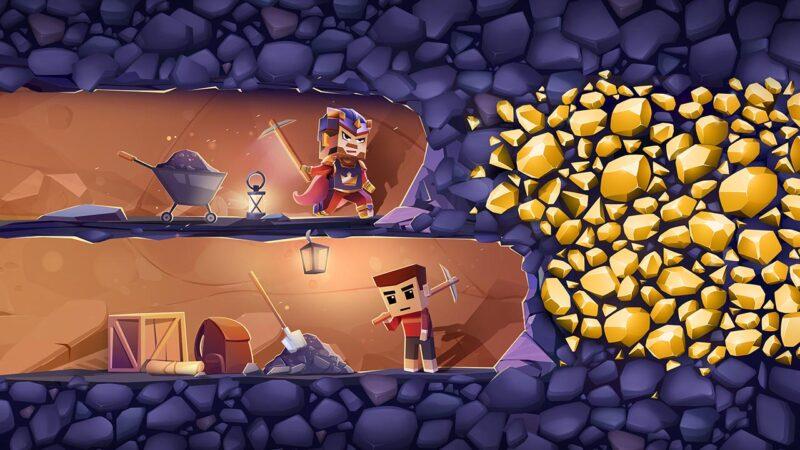Mobile game development isn’t the trickiest bit in the process of making video games, but getting it published and seeing it succeed is a whole other story. Azur Games is one of the leading international mobile game developers and publishers worldwide and the company is known for its unique approach to mobile gaming.
Related: How to launch a hyper-casual game in 2022 – MBC 2022
For Azur Games, CPI (cost per install) alone isn’t a deciding factor and they regularly publish case studies to back up their claim, to show that there’s always a different strategy out there. Azur Games’ latest study follows three different cases; each one was abandoned by publishers due to low metrics, but picked by Azur and thrived later on.
The mobile game publisher’s cases for this study are Chain Cube by Ignat Bykov, Stretch Legs by Mocca Games, and Sword Play by Bars Studios.
Chain Cube
Azur Games puts Chain Cube by Ignat Bykov as one of their benchmark cases. Azur says Bykov came to them in 2020 after the prototype of the title was turned down by a publisher following its first test. The case study claims the results of the first test of the prototype were:
- CPI under $1
- 2-star rating
- Day 1 playtime — 16 minutes
- R1: 39%
The gaming entity says while the R1 was nearly 40%, the monetization method Chain Cube used was “annoying” and caused a fast dropoff in users on Day 2.
What Azur did for Chain Cube: The gaming firm recognized that the interstitial ad system didn’t reward players to a more native add system that did; also added features like reward windows and multiple leaderboards. It also added a saving progress feature to increase retention.
The Azur team also increased the contrast levels of colors to make cubes detached from the background.
“We implemented a plethora of small improvements like vibration feedback, merge effect, a delay for the ‘Cancel’ button popping up on the 2x reward for watching an ad offer, and so on. We also tested dozens (maybe hundreds) of icons and ad creatives for better marketing.”
Azur Games
The result: R1 increased to 60% and Day 1 playtime increased to 30 minutes, Day 30+ saw an average of 15 minutes of playtime. The game also showed over 130 ads on Day 1. Azur also notes that over 5% of the player base paid for the ad-free version of the game.
The game was rated 4.3 stars and had tens of millions of installs and active players in hundreds of thousands on a daily basis.
Stretch Legs
The gaming firm claims Stretch Legs by Mocca Games was turned by a major publisher due to a low R1 rate and CPI of 40 cents.
What Azur did for Stretch Legs: Once it landed with Azur, the mobile game publisher saw to adding new and engaging mechanics to the title to increase retention. Azur says they made the ice crumble under players’ feet and changed pillars with beach balls and a few other changes followed. The publisher also experimented and changed how often new game mechanics would appear.
Related: Panteon’s Airport Master reaches 10 million downloads
Azur says they also experimented with levels where players could fail, but the overall win rate was the same; the game’s focus was on offering satisfying gameplay. The team also decided to go with a softer, pastel color palette and a faded background.
The result: Per the case study, Stretch Legs’s LTV was increased by 10% and the company saw ROAS (return on ad spend) of 90-180%; Azur invested $1 million in UA with a projected 123-130% Day 180 ROAS. Azur’s report shows that the game is making a profit.
The report also points to being able to hold R1 at 30% despite a massive increase in user acquisition. Stretch Legs’ CPI is stable at around 35 cents, says the gaming entity and adds that Azur and Mocca Games continue to work on new projects, however, nowadays hybrid casual games.
Sword Play
The case study mentions Sword Play (well, its full name is Sword Play! Ninja Slice Runner 3D, but you get the gist) as a unique case. The report says the unnamed publisher returned this game back to its developer, Bars Studios, mainly because the first iteration was ready to go already with good metrics, but the unnamed publisher wanted to make improvements and each version got worse in terms of metrics.
The first iteration of the game was indeed quite good;
- CPI under 30 cents
- R1 over 40%
- Playtime is about 7 minutes
Azur Games says the game was more than ready enough even as a prototype and claims that the unnamed publisher just made things complicated, and then bailed out.
What Azur did for Sword Play: The team just rolled back all the updates this publisher added and pushed the game out right away. Sword Play rankled number one across both Google Play and App Store in the US for five days says the mobile game publisher and adds that it has accomplished this huge success without being featured.
The game maker then improved the game here and there while protecting the game’s style. They added new weapons, armor mechanics, and bosses to keep the game interesting and improve the retention rate.





